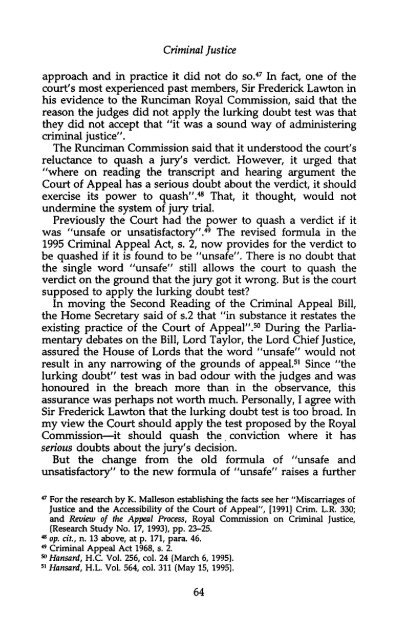HAMLYN - College of Social Sciences and International Studies ...
HAMLYN - College of Social Sciences and International Studies ...
HAMLYN - College of Social Sciences and International Studies ...
You also want an ePaper? Increase the reach of your titles
YUMPU automatically turns print PDFs into web optimized ePapers that Google loves.
Criminal Justice<br />
approach <strong>and</strong> in practice it did not do so. 47 In fact, one <strong>of</strong> the<br />
court's most experienced past members, Sir Frederick Lawton in<br />
his evidence to the Runciman Royal Commission, said that the<br />
reason the judges did not apply the lurking doubt test was that<br />
they did not accept that "it was a sound way <strong>of</strong> administering<br />
criminal justice".<br />
The Runciman Commission said that it understood the court's<br />
reluctance to quash a jury's verdict. However, it urged that<br />
"where on reading the transcript <strong>and</strong> hearing argument the<br />
Court <strong>of</strong> Appeal has a serious doubt about the verdict, it should<br />
exercise its power to quash". 48 That, it thought, would not<br />
undermine the system <strong>of</strong> jury trial.<br />
Previously the Court had the power to quash a verdict if it<br />
was "unsafe or unsatisfactory". 49 The revised formula in the<br />
1995 Criminal Appeal Act, s. 2, now provides for the verdict to<br />
be quashed if it is found to be "unsafe". There is no doubt that<br />
the single word "unsafe" still allows the court to quash the<br />
verdict on the ground that the jury got it wrong. But is the court<br />
supposed to apply the lurking doubt test?<br />
In moving the Second Reading <strong>of</strong> the Criminal Appeal Bill,<br />
the Home Secretary said <strong>of</strong> s.2 that "in substance it restates the<br />
existing practice <strong>of</strong> the Court <strong>of</strong> Appeal". 50 During the Parliamentary<br />
debates on the Bill, Lord Taylor, the Lord Chief Justice,<br />
assured the House <strong>of</strong> Lords that the word "unsafe" would not<br />
result in any narrowing <strong>of</strong> the grounds <strong>of</strong> appeal. 51 Since "the<br />
lurking doubt" test was in bad odour with the judges <strong>and</strong> was<br />
honoured in the breach more than in the observance, this<br />
assurance was perhaps not worth much. Personally, I agree with<br />
Sir Frederick Lawton that the lurking doubt test is too broad. In<br />
my view the Court should apply the test proposed by the Royal<br />
Commission—it should quash the conviction where it has<br />
serious doubts about the jury's decision.<br />
But the change from the old formula <strong>of</strong> "unsafe <strong>and</strong><br />
unsatisfactory" to the new formula <strong>of</strong> "unsafe" raises a further<br />
47 For the research by K. Malleson establishing the facts see her "Miscarriages <strong>of</strong><br />
Justice <strong>and</strong> the Accessibility <strong>of</strong> the Court <strong>of</strong> Appeal", [1991] Crim. L.R. 330;<br />
<strong>and</strong> Review <strong>of</strong> the Appeal Process, Royal Commission on Criminal Justice,<br />
(Research Study No. 17, 1993), pp. 23-25.<br />
48 op. at, n. 13 above, at p. 171, para. 46.<br />
*> Criminal Appeal Act 1968, s. 2.<br />
50 Hansard, H.C. Vol. 256, col. 24 (March 6, 1995).<br />
51 Hansard, H.L. Vol. 564, col. 311 (May 15, 1995).<br />
64

















